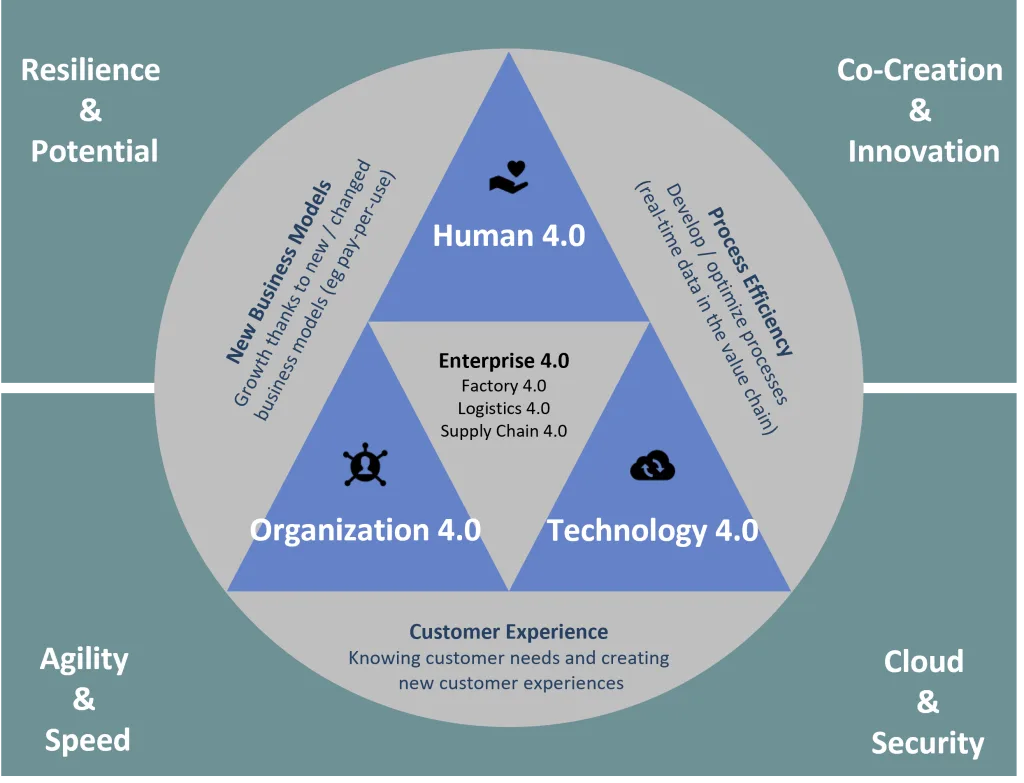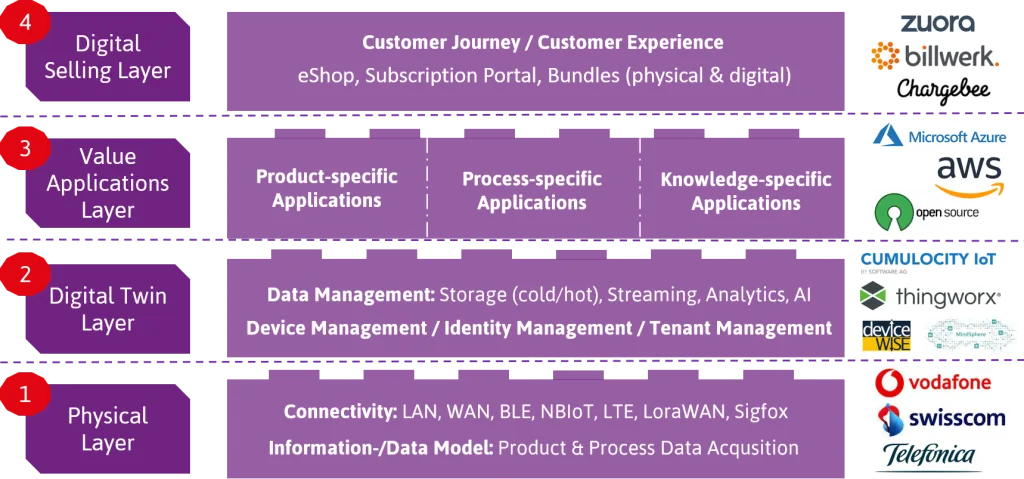Subscription Economy 4.0: The transformation of the organization in the “fourth industrial revolution”
Subscription Economy: From Strategy Development to Implementation By Ralf Günthner […]
- Subscription Economy: From Strategy Development to Implementation
- Subscription Economy: Comprehensive cooperation on all levels
- Technology 4.0: Real-time information & knowledge generation
- Organization 4.0: Internal adaptations for an agile company
- People 4.0: Changed mindset & a new way of working together
- Subscription Economy: Sales- and Marketing-Approach
- Subscription Economy: Approach to implementation
- Conclusion
Subscription Economy: From Strategy Development to Implementation
By Ralf Günthner and Lutz Rahn
The “Subscription Economy” – and by that the shift from “owning” to “using” a product – represents one of the most disruptive changes in recent years for corporate business models.
In the manufacturing industry, the term “servitization” has become established: The product remains the property of the manufacturer (shifting budgets from capex to opex) and the manufacturer makes sure it does exactly what it is supposed to do.
For example: a centrifuge in a laboratory separates liquids, a compressor generates air and an injection molding machine produces plastic parts. The central aspect here is the networking of the products – so the manufacturer is informed about the health condition of the individual components on a regular basis. He can access the relevant data remotely and – if necessary – interact.
This kind of networking connects objects to the Internet and gives them their own identity, so to speak. This enables products to exchange data and information with other products. For the future, this means that products will use data and information to initiate actions themselves by using integrated artificial intelligence (AI).
This development is part of the so-called “fourth industrial revolution”. We – the Subscription Rebels – therefore label people, organizations and technologies that are part of the Subscription Economy with the suffix “4.0”.
Subscription Economy: Comprehensive cooperation on all levels
In the course of the Subscription Economy, new technological and organizational possibilities and concepts are used, which help to further optimize companies internally as well as to develop new business models, products and services for the market.

Central to this are creativity and the development of new ideas – without them, the disruptive innovations that make “Enterprise 4.0” more competitive will not work. The basis for the success of the Subscription Economy is trusting, appreciative cooperation and the greatest possible transparency. Cooperation transcends functional and corporate boundaries and is anchored in the DNA of the company. Decisions are made where they are necessary to continue an activity, regardless of hierarchies.
The transformation to a “Subscription Company” is therefore accompanied by far-reaching changes in the dimensions of technology, organization and people.
Technology 4.0: Real-time information & knowledge generation
In subscription models, products network and exchange product and process data via an IoT cloud solution. This provides real-time information on how the product is doing, when it needs maintenance, and which part should be replaced next.
With the help of machine learning algorithms (or AI solutions), predictions are made regarding product behavior and process optimizations are uncovered.
Another benefit is that the knowledge generated in this way can be offered to product users as an additional subscription service. A well thought-out enterprise architecture is one of the most important success factors.

Organization 4.0: Internal adaptations for an agile company
The development towards a subscription company also means that it is imperative to make adjustments to internal processes and organizational structures.
Why? Customers now have the option to customize their subscription. In these cases, it is always necessary to react quickly: An agile organization is essential here – and in all areas of the company, from production to logistics to finance.
People 4.0: Changed mindset & a new way of working together
The shift “away from hierarchical structures” to “self-organized teams” that make their own decisions is another challenge of the Subscription Economy. For this to work, a changed mindset as well as a different type of collaboration are necessary. If, in the traditional business model, a task is specified from above and assigned to a specific unit for processing, this is often obsolete in the subscription model.
Future customer needs based on continuously generated usage data must be translated promptly into new, beneficial subscription services. This works best in interdisciplinary teams that are familiar with agile methods. Employees can also fulfill multiple roles – depending on their individual skills.
Find out more about BILLWERK+ & scale your growth
Automate your subscription business model with BILLWERK+ Subscription Management & Recurring Billing.
Subscription Economy: Sales- and Marketing-Approach
The example of the sales department is a good way to explain the transformation process to a subscription company. In the traditional business model, the focus is on one-time sales of products. Salespeople use product descriptions with all USPs as a tool. When a new product is launched, it is promoted on a specific release date via social media, the website, or even press articles.
In the subscription business model, on the other hand, customers use the subscription self-service portal to subscribe to digital or physical products. They do not buy individual products, but a permanent service. It is therefore important to keep customers motivated over many years so that they keep renewing their subscription or possibly subscribe to additional services.
This change “from hunting to farming” accordingly also has far-reaching consequences for the marketing and sales organization. Adjustments to the bonus system, skills of the sales force, certain key performance indicators and marketing strategies are unavoidable.
Subscription Economy: Approach to implementation
One of the main questions at the beginning of a subscription project is always how to proceed. Since subscription projects are rarely comparable with so-called classic projects, an adapted approach is required here. Subscription projects are not only special because of their cross-sectional structure. They are usually also culturally challenging, because they question and in some cases significantly change existing corporate processes and IT solutions. The disciplines and IT solutions of a company that need to be involved range from existing sales channels (e.g., eShops) to product development, marketing, and support units such as legal, tax, and finance departments.
Appropriate orchestration of the relevant units is one of the greatest challenges and critical to the success of a subscription project. In this context, a high speed in iterative, experimental and agile project approach is one of our “Top 6 Key Take-Aways”.
Conclusion
Let’s summarize: The transformation from a traditional to a dynamic business model holds an enormous amount of future opportunities for any product manufacturer. However, this mission-critical project requires a holistic and highly strategic approach to realize the full potential of a subscription economy and not fail due to the immune system of the existing organization.
We always recommend building an interdisciplinary team of internal and external experts who are familiar with the 4.0 mode in technology, people organization and project approach. That such a project must be sponsored and actively supported by the CEO goes without saying.
More about Lutz Rahn and Ralf Günthner
Lutz Rahn is one of the co-founders of Subscription Rebels and has a lot of experience as a management consultant. He has been supporting companies for many years in important IT management topics such as digitalization, digital transformation, sourcing, governance and program or project management and offers know-how from a wide range of industries.
Lutz Rahn on LinkedIn and Xing.
Ralf Günthner is also co-founder of Subscription Rebels and, together with Lutz Rahn, has set himself the goal of working with companies to design an individual subscription journey. The “digital pioneer” has many years of experience in the fields of digitization, strategy and management consulting.
Ralf Günthner on LinkedIn and Xing.
About Subscription Rebels
Subscription Rebels develop customized subscription strategies and business models together with their customers and implement these agilely and quickly into monetizable solutions. Founded in 2021, the company sees itself as a coach and advisor that co-creatively designs and implements an appropriate business model with its customers based on various methods (Business Model Canvas, Design Thinking, LeanStartup, etc.).

